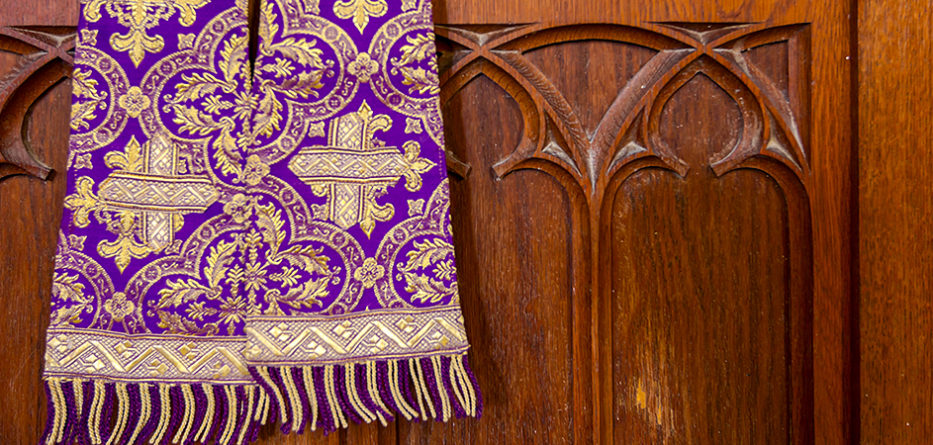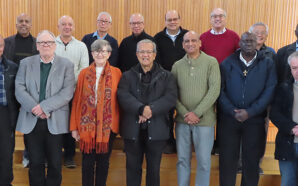Homily for the 30th Sunday in Ordinary Time
Readings: Jeremiah 31:7-9; Psalm 125 (126); Hebrews 5:1-6; Mark 10:46-52
24 October 2021
Welcome out of lockdown.
In today’s gospel from Mark, we accompany Jesus at the end of his journey from Galilee to Jerusalem. He arrives in Jericho near Jerusalem and works his last miracle – restoring the sight of the blind beggar Bartimaeus. Early in the journey up at Bethsaida in Galilee, Jesus had cured a blind man with a 2 phase operation, first putting spittle on the man’s eyes and laying hands on him, and then once again laying hands. He sent the man home. After this healing, Peter and the disciples see that Jesus is the Messiah but they fail to see that Jesus is to suffer and die. They see the first part of the revelation but not the second. Now towards the end of the journey to Jerusalem, Jesus cures the blind beggar at Jericho. Jesus simply says to him, “Go; your faith has saved you.” At once his sight returns, and he follows Jesus along the road to Jerusalem.
LISTEN: https://soundcloud.com/frank-brennan-6/homily-241021
Mark expects his reader to note a number of contrasts. Bartimaeus follows Jesus without hesitation. Mark tells us a little earlier that the disciples on the road were in a daze following Jesus apprehensively. Earlier on the journey, the rich young man goes away sad having been told to sell what he owned and to come follow Jesus. Bartimaeus threw off his cloak, the only thing he owned, and followed Jesus. When James and John on the road had asked for a favour, Jesus asked them, “What is it you want me to do for you?” He asks Bartimaeus the same question. James and John want places of honour and Jesus tells them “You do not know what you are asking”. Bartimaeus wants to see again and Jesus says, “Go, your faith has saved you.”
Unlike Peter, unlike James and John, unlike the rich young man, unlike the other blind beggar in Jericho, Bartimaeus gets it. He sees Jesus for who he is. He is completely cured of all blindness. He twice proclaims Jesus as ‘Son of David’. He asks for nothing but pity. He has faith that Jesus can make him see again. He follows Jesus immediately without being apprehensive. And he does this while many of those around him scold him, telling him to keep quiet and not make a scene.
Bartimaeus is more the model disciple than any of the others. We are invited to do likewise. “Son of David, Jesus, have pity on me.” Forget about those around me scolding me and telling me to keep quiet. Throw off the cloak. Jump up and go to Jesus. Utter the words: “Rabbuni, let me see again.” Follow him along the road.
During the week, we witnessed the courtroom scene in Minnesota with the judge hearing the pre-sentencing submissions for Mohamed Noor, the police officer who shot and killed the Australian woman Justine Ruszczyk Damond who had the misfortune of calling 911 to attend to a disturbance outside her residence. Justine’s fiancé Don Damond spoke of the need for justice and then offered forgiveness. He praised the prosecutors for their “sound application of the law” and criticised the state Supreme Court which had reduced Noor’s offence from murder to manslaughter. He observed that the court decision “does not diminish the truth that was uncovered during the trial. The truth is Justine should be alive. No amount of justification, embellishment, cover-up, dishonesty or politics will ever change that truth.”
Don Damond then spoke directly to Mahomed Noor forgiving him and telling him that no doubt Justine also would have forgiven him “for your inability in managing your emotions that night”. Noor responded, “I’m deeply grateful for Mr Damond’s forgiveness. I will take his advice and be a unifier. Thank you.” [1]
The cry for pity is not just a cry for justice. It’s also a cry for mercy and forgiveness.
Today, we conclude Childhood Sexual Abuse (CSA) Awareness Week which commemorates the three-year anniversary of the Commonwealth Government’s National Apology to Victims and Survivors of Institutional Child Sexual Abuse. During the week, I was interviewed on Perth radio in response to the new laws in WA implementing the recommendations of the Royal Commission that people in religious ministry be made mandatory reporters of child sexual abuse. [2] As ever, the media and the politicians have focused on Recommendation 7.4 of the Royal Commission: “Laws concerning mandatory reporting to child protection authorities should not exempt persons in religious ministry from being required to report knowledge or suspicions formed, in whole or in part, on the basis of information disclosed in or in connection with a religious confession.” [3]
I have no problem with people in religious ministry being made mandatory reporters. The more mandatory reporters, the better, for the protection of vulnerable children. But as I pointed out on air, criminal lawyers, family lawyers and investigative journalists are far more likely than ministers of religion to hear substantive information and evidence of child sexual abuse. Why not make them mandatory reporters?
Those of us with experience of confession in the Catholic Church know that paedophiles do not present openly in confession. Even when the seal of the confession was protected by law, paedophiles rarely if ever presented for confession. Like any penitent, they always have a choice of coming to confession anonymously. Like any penitent, they can confess their sins in such a way that the priest knows nothing of time, place, or victim of their sins. Having been a priest for 36 years, I know that this recommendation of the Royal Commission is largely, if not completely, symbolic.
The reason our society does not mandate that criminal lawyers, family lawyers and investigative journalists report child sexual abuse in all circumstances is that society still thinks there is a value in clients being able to maintain legal professional privilege and in investigative journalists being able to protect their sources. But society sees no value in a person being able sacramentally to ask pity and healing, mercy and forgiveness of their God. Society judges child sexual assault to be an unforgivable crime and the perpetrator to be irreformable. Society may well be right in its assessment of our very limited capacity to put right child sexual abuse. There is much that we human beings cannot put right in ourselves, in others, and in diverse situations. The Christian on the road to Jerusalem witnessing Jesus restoring the sight of Bartimaeus has faith in a God who can forgive any sin and who can reform any ailment or deficiency. For many, that is a shocking profession of faith. But that’s what the sacrament of confession is about.
Maintaining this faith, we Christians like all our fellow citizens, need to confirm our commitment to the safety and well-being of children, responding “with openness, compassion and generosity to those who have been victims and are now survivors of the terrible crime and sin of sexual abuse”. [4] But we also need to maintain hope that anyone like Bartimaeus can come to see clearly on the road to Jerusalem. We rejoice that Don Damond can forgive Mahomed Noor while at the same time decrying the injustice perpetrated by the state. We are grateful that society is more attentive to the needs of vulnerable children and at the same time we thank God for showing pity to all wrongdoers who seek his healing touch. We are heartened by Jeremiah’s account of Yahweh’s declaration to his people:
“They left in tears,
I will comfort them as I lead them back;
I will guide them to streams of water,
by a smooth path where they will not stumble.”
Fr Frank Brennan SJ is the Rector of Newman College, Melbourne, and the former CEO of Catholic Social Services Australia (CSSA). He has been appointed a peritus at the Fifth Plenary Council of the Australian Catholic Church.
[1] See https://www.smh.com.au/world/north-america/police-officer-who-fatally-shot-justine-damond-sentenced-to-less-than-5-years-in-jail-20211022-p59268.html
[2] Listen to 6PR, 21 October 2021, from 43:14- at https://www.6pr.com.au/mornings-with-liam-bartlett-podcasts/
[3] Recommendation 7.4, Royal Commission into Institutional Responses to Child Sexual Abuse, available at https://www.childabuseroyalcommission.gov.au/sites/default/files/final_report_-_recommendations.pdf
[4] Archbishop Timothy Costelloe, Pastoral Letter, 21 October 2021, available at http://www.perthcatholic.org.au/Our_Archdiocese-Archbishop-Latest_News-Pastoral_Letter__Community_and_Family_Services_Amendment_Bill_2021.htm








